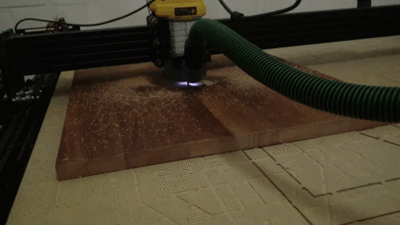CNC Router

A CNC router is a computerized woodworking machine - basically a router mounted on a positioning system. While it may also be able to handle other materials than wood depending on the bits you use, a proper CNC mill is more precise for machining parts out of metals and other non-wood materials.
To use this machine, you need to familiarize yourself with at least two pieces of software:
- a CAD/CAM program (e.g. Fusion 360)
- may also be two different programs, one for CAD and one for CAM
- a G-Code sender
There is also an interesting new approach of handheld CNC routing coming out which may remove the size constraints that come with any fixed-frame machine.
Uses
You can make furniture or even build a house. For more ideas, check out the CNC Milling Ideas.
WorkBee
| MachineInfoBox Ooznest WorkBee CNC | |
|---|---|

| |
| Synonyms: | DE: CNC-Fräse, Portalfräsmaschine |
| Material: | wood |
| Used with: | 6 mm, 8 mm, 1/4" or 1/8" end mills; some kinds of router bits |
| Access Requirements: | CNC Router Introduction |
| Software: | LaserWeb, Fusion360, see G-Code Sender |
| Firmware: | grbl |
| Manual: | product page, click "documentation" tab |
| Tutors: | NitramLegov Pakue Johannes Luzian Leo Maker-Joe |
| Similar (More or Less): | router, CNC mill |
We built the 1500mm x 1500mm version of the WorkBee CNC, which is based on the Openbuilds OX. It can currently cut sheet material of up to 20 mm thickness on a work area of approximately 1250 × 1250 mm.
Details on setting it up can be found in issue #8 - maybe you would like to help?
Router
The router mounted to it is a Dewalt D26200 (GB). You need to consider the sizes of its collets (Spannzangen) when buying your router bits.
- no-load speed: 16000 - 27000 rpm
- max cutter diameter: 30 mm
- available collet diameters:
- 6 mm
- 8 mm
- 1/4 inch (6.35 mm)
- 1/8 inch (3.175 mm)
The collets of the DW613, DW620 and DW621 also fit the router and are easier to get in Germany than the original ones.
G-Code Sender
After creating the tool paths in a suitable CAM software (e.g. Fusion 360) they need to be sent to the router in real time via the serial interface (USB).
Our experiences can be found on: G-Code Sender
Tips & Tricks
- to avoid tear-out at the edge of a sensitive workpiece, it may be worthwhile to surround it with some sacrificial material (like MDF) before routing [1]
Spoiler board
Ooznest recommends a 6mm spoiler board, our first one is 20mm thick. It is mounted to the frame using 4 drop-in T-slot nuts. Cutting into the boards will make it uneven, from time to time it is neccessary to surface the spoiler board again.
Materials
Aluminum
With a lot of patience an the correct bits possible but check if it's millable aluminum
- differnt alloys of containing Cu, Si, Pb
Bits
maximum two cutting sides carbide is more rigid than HSS and advised by some online guides Tested 4mm 2-sided pointy-end bit with acceptable success
RPM, Speeds, etc.
Values are only the tested ones, faster CAN be possible as well
- slow RPM: 16 000 is our minimum but e.g. for a 4mm bit, 6000 RPM would be better
- Schnittvorschub: max.100 mm/min
- Einfahrvorschub: 15-20 mm/min
- Ausfahrvorschub:can be 1000 mm/min
- Helixvorschub: 15-25 mm/min
- Eintauchvorschub: 15 mm/min
- Depths: 0.25mm per pass
Milling directions (to be tested): Conventional/Up-Cut (Gleichlauf) milling milling for the basic different passes with a finish using Climb-milling/Down-Cut milling (= Gegenlauf)
Cooling
Not yet tested
- any sort of lubricant or coolant will increase the efficiency of aluminum milling
- there are suggestions ranging from cutting fluid over WD-40 to candle wax for lubing
- As coolant, a water or alcohol mist seems unsuitable with our pressboard
- instead, using the air compressor might be a possiblity
POM/Acetal/Delrin
Bits
tested with 2 and 3 sided HSS Bits 4mm-6mm but no indication against any other diameters
RPM, Speeds, etc.
Spindle on level 1 (=16 000rpm)
- Schnittvorschub: 500mm/min +
- Einfahrvorschub: 500mm/min +
- Ausfahrvorschub: 500mm/min +
- Helixvorschub: 200mm/min +
- Eintauchvorschub: 30mm/min
- Depths: 2-3mm
Strongly advise a horizontal Rohteilaufmaß and a final finishing cut to remove any "layer" marks.
Cooling
Not neccessary with the current settings but might increase the cutting speeds drastically
Helpful Links
- video tutorials:
- Ooznest YouTube channel (pretty new, but specific to our setup
- other spaces with (somewhat) similar machines and good approaches/documentation: